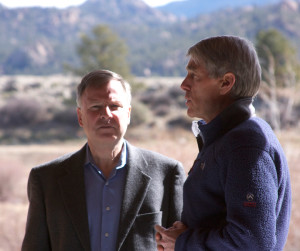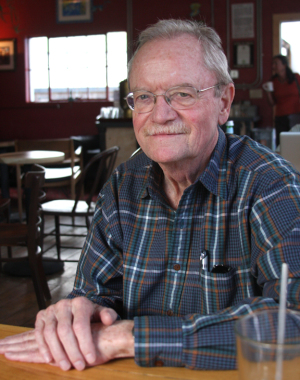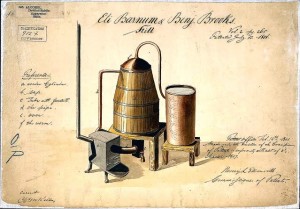By Martha Quillen
Lassie is crying and agitated. “What’s wrong, girl? Are you trying to tell us that Timmy is in danger again?”
Forget Lassie and all that whining, barking and carrying on. Some fictional pets are far more erudite and even tell their own stories. There’s a new book out, Love Saves the Day, narrated by a cat, and a modern mystery series as told by Chet the dog. A dead dog addresses his owner in the poem The Revenant, and just a few years back, Enzo Ferrari, a canine philosopher, hit the bestseller lists with The Art of Racing in the Rain.
Last week a woman said to me, “Wouldn’t it be wonderful if dogs really could talk?”
I was startled. I love dogs, but my immediate reaction was, “No way.” Regardless of his talented literary counterparts, my dog would probably sound more like a discontented teenager than a sage.
“All of my friends get to run free,” my dog would opine.
“Why do I have to eat kibble every day? And don’t tell me it’s good for me — because if that were truly important, you wouldn’t eat ice cream and chocolate bars.”
“You think I don’t work?” my dog might howl. “Who is it who guards this house night and day? You don’t really appreciate anything I do, do you?”
Of course, talking pets would bring a whole new dimension to our discussions. Who knows what insights dogs would give us. After all, dogs sniff out cancer and detect seizures before they happen; they smell marijuana hidden in luggage and hear sounds that humans can’t. If dogs could talk, they might reveal important things that humans ought to know.
But in all likelihood we wouldn’t listen. That problem doesn’t lie with our pets, though. On the contrary, your dog may actually pay more attention to your pronouncements than most people do.
I had just started reading Love Saves the Day, a novel featuring the musings of a cranky cat, when The Carbon Crunch arrived. It’s a new book by Dieter Helm about how we are getting climate change wrong and what we should do about it. Helm is a professor of energy policy at the University of Oxford, a government advisor in the UK, and a former advisor to the European Energy Commissioner, so I figured he’d have more important things to say than a cat. Thus I put Love aside and started Crunch.
Helm is a good writer: clear and understandable, and perhaps more importantly not beholden to any particular political viewpoint. He hopes to inspire new directions for energy policy, but his analysis of climate change policy is thoroughly discouraging.
After two decades of European attempts to address climate change by reducing carbon emissions, international efforts have failed. Great Britain, for example, reduced its carbon production by 15%, but as its industrial economy gave way to banking and service sector jobs, the population came to rely on Chinese imports that were manufactured in inefficient coal-fueled plants and shipped to the United Kingdom, which actually increased Britain’s so-called “carbon footprint.”
In similar fashion, some green technologies, including ethanol, biofuels and off-shore wind operations, have offered disappointing results and are hugely expensive. But powerful lobbies promote them, nonetheless, and that keeps them going — even though they may actually hinder environmental progress.
Perhaps even more discouraging than Helm’s critique of climate change policy is the bigger picture he paints. Brazilians are slashing down rain forests to fuel their energy industry. Around the world, huge amounts of water and farmland previously devoted to food crops have been committed to energy crops, which is exacerbating malnutrition and starvation. China and India are manufacturing our clothing, toys and electronics with energy produced by dirty, pollution-producing, coal-powered plants. And everybody everywhere is shipping almost everything hither and yon for who knows what reason.
What Helm makes clear is that our global problems aren’t just about climate change, or energy, or the environment. We live in a world that is rapidly changing and there is no going back. Some of the news is good: the poverty-plagued undeveloped world is industrializing and its citizens are enjoying higher standards of living. However, some factors of that are bad: their power plants and products don’t tend to be state of the art, and solutions are neither simple nor intuitive. One proven way to increase energy efficiency is to keep energy prices high enough to encourage research, innovation and conservation, but that hardly seems fair to the poor of China, Malaysia, or even the United States.
Readers may take issue with some of Helm’s contentions, but his primary argument is not in dispute: Strategies to alleviate carbon emissions have failed and should be revamped. I suspect, however, that Republicans will glean Helm’s arguments for examples to refute Obama’s alternative energy plans, and Democrats will reflexively defend the green technologies Helm criticizes. But such stances will only make matters worse.
What’s obvious is that politicians should quit issuing unrealistic proclamations and promoting self-serving, politically motivated non-solutions. We should discuss controversial matters with more honesty and integrity and less vitriol. Citizens need to think more carefully, discuss things more intelligently, and act more diligently.
But is that likely?
Sure, when dogs talk.
I haven’t finished The Carbon Crunch yet, but I presume Helm will offer some sound advice in the end, which will likely spark lots of conversation. But I don’t expect it to make much difference. The trouble with talk is that there’s so much of it, it’s difficult to prioritize. There are so many things to discuss: Will the sequestration plummet us into recession? Will the middle class continue to decline? Will Social Security survive?
Calamity seldom strikes without warning, but it’s hard to know which warnings to heed. The ones about Mayan calendars? Or global warming? Or the proliferation of automatic weapons? Or would it be wiser to worry about the proliferation of new housing developments in our fire-prone forests?
Sadly, if you’ve got too many concerns, you’re not likely to resolve many of them. And that, I suspect, is where modern communication has led us — into a huge, seething cauldron of concerns that really aren’t being addressed.
It is astounding how much language separates humans from other animals. Without language there would be no sharing of information, no means to pool ideas, no way to pass on technology or describe complex systems. Without the ability to speak, humans would presumably be relegated to inventing only the simplest of tools: spears, forks, rope and simple dwellings rather than skyscrapers, jets, nuclear bombs and power plants.
Clearly language makes modern life possible. Yet one has to wonder whether it gives us any control over our destiny. Do we control our inventions? Or do they control us? Once an invention is introduced, is there any way to un-invent it? And now that banks and businesses have gone global, is there any way to hold them accountable?
Perhaps dogs and cats have the answers, but they aren’t talking.
Martha Quillen has a dog that can’t talk but can communicate: “I’m hungry. Let me out. Let’s go for a walk. Let’s play ball. Are you going to sit there and stare at that screen all morning?”





Martha:
Words, letters, the arranging and rearranging of their various parts and pieces are the human kibble .Bowl upon bowl which some-intellectual bean counters have been known to devoure. Some even save a special nugget and tack that special kibble letter to the end of their moniker like so much people chow. (I always thought wheat chex was a top contender for best people chow.)
Consider the lower statured Corgi who without speech or special abilities in advanced intellectual showiness has managed to achieve the top of the heap. With n0 real legs no special talents beyond barking and loving life. This perky little hair spreader has managed to achieve the highest level attainable. A dog that is cared for by the Queen of England. A mutt running free in Buckingham palace as well as any other Dukedom or bejeweled historical pinnacle.
Sorry about all the (sick) (sics).